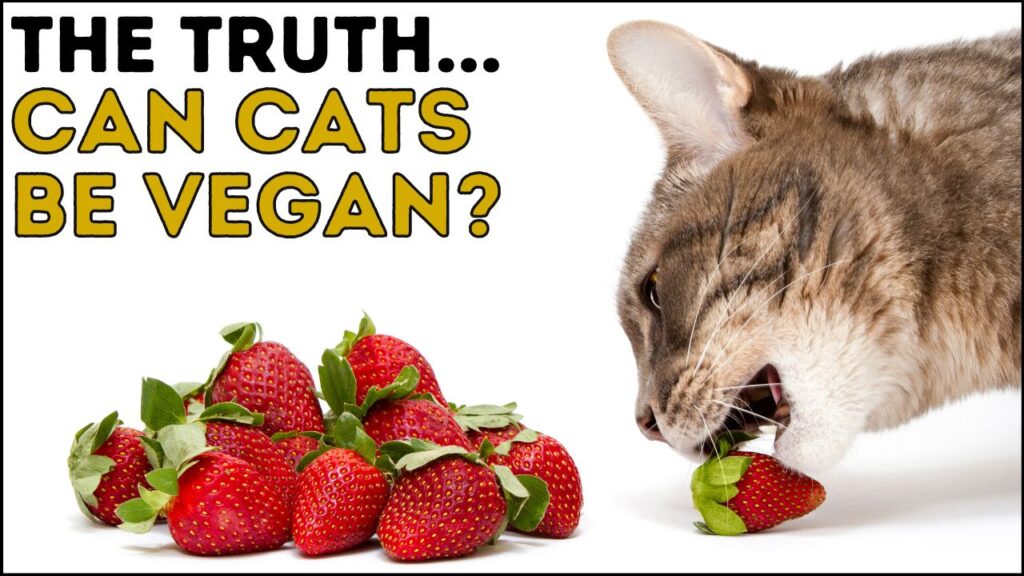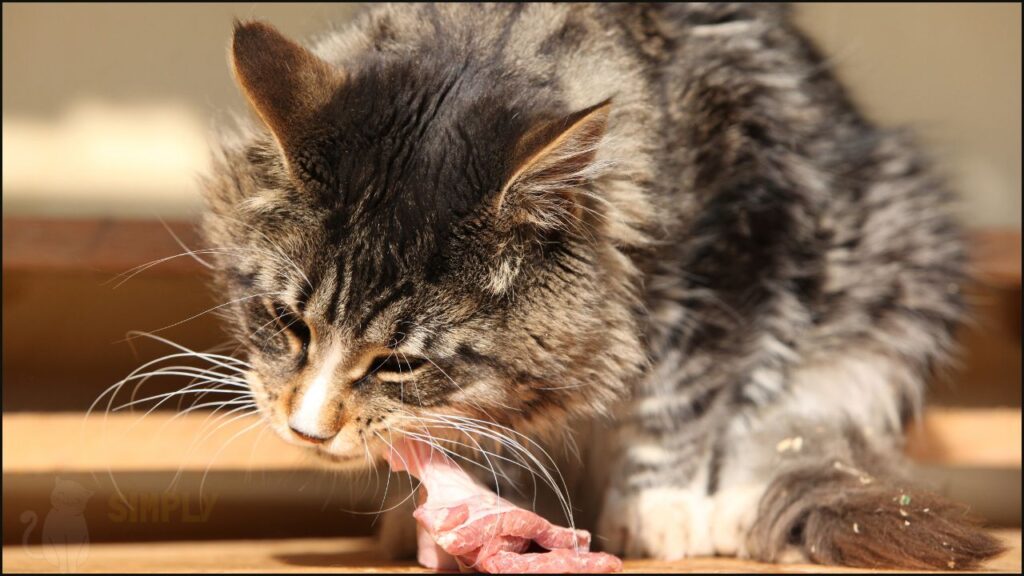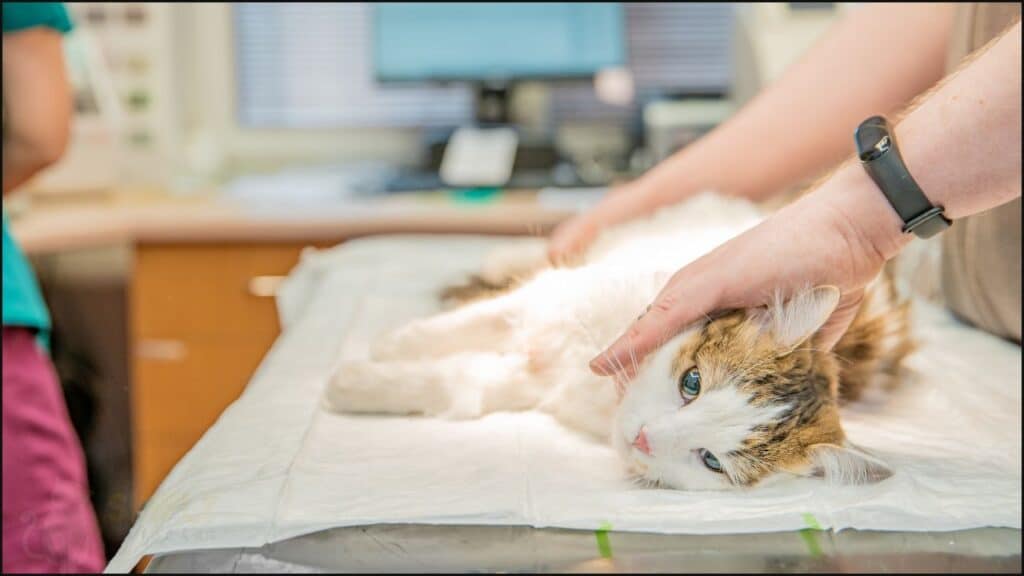Maybe.
Cats are carnivores. They can’t use many nutrients found in plants.
Without meat, cats suffer nutrient deficiencies.
However, with the intervention of man, can we make balanced vegan cat food?
Read on to find out more…
In this article, I’ll look at the science of veganism in cats. I’ll review best practices and health concerns.
Finally I’ll answer some frequently asked questions on the topic of vegan cat food.
I am not a veterinarian and I recommend seeking the advice of a vet for any further questions. This article isn’t a replacement for medical advice.
Here’s the article.

Can Cats Eat a Vegan Diet?
Maybe.
One way of looking at nutrition, is as ‘raw materials’.
Amino acids. Vitamins. Minerals. Water.
From that perspective, the food doesn’t matter, as long as it doesn’t have excess or deficient nutrients, as well as other toxic compounds.
The problem is cats are strict carnivores.
What does that mean for a cats diet?
Let’s find out…
A Cats Diet
Cats eat a high protein and fat diet.
This is a cats preference. Wild cats eat almost no carbs.
A cats body is adapted to eating meat.
They have:
- Short gut
- Lack of carb digesting enzymes
- Dentition for tearing flesh
- High protein requirement
Cats can’t use essential fatty acids from plant based foods or Vitamin A. Taurine is essential in cats, unlike humans.
They need meat, or a supplemented vegan diet.

Carbohydrate Requirements for Cats
Cats have zero need for carbs.
AAFCO offer no targets.
Cats are carbohydrate intolerant. They tolerate ~20g of carbs per day (~12% dry matter basis).
Cats lack enzymes for carb digestion.
In the short term, cats may experience diarrhea with high carb diets.
Related:
Importance of Protein
Cats need twice as much protein as man.
AAFCO recommend 26% protein for maintenance, and 30% for growth.
Cats use protein for structure (e.g. maintaining muscle) and energy.
Unlike humans, cats are using protein at all times for energy.
Protein is made of amino acids. 11 are essential for cats.
This includes taurine, which is high in fish.
The quality and amount matters.
Vegan protein sources tend to be ‘lower quality’.
Here’s a comparison:
| Protein Source | PDCAAS |
| Chicken breast | 100% |
| Casein (dairy protein) | 100% |
| Whey (dairy protein) | 100% |
| Egg | 100% |
| Soy protein isolate | 98% |
| Soy flour | 93% |
| Red Meat | 92% |
| Pea protein (concentrate) | 89% |
| Meat meals | 80% |
| Meat by-products | 80% |
| Black bean | 75% |
| Chickpea | 74% |
| Yellow split pea | 64% |
| Green lentil | 63% |
| Rice protein (concentrate) | 42% |
| Wheat gluten | 25% |
| Corn cereal | 8% |
Some vegan sources are good, like pea protein.
Others are poor, like wheat gluten.
A vegan diet made of a crappy protein like wheat gluten won’t do. However, a pea protein is comparable in quality to meat.
Plant protein also contains less methionine, tryptophan, and cysteine. Cats need methionine for coat health and pheromones.
On the other hand, research suggests a low methionine diet improves lifespan in worms, flies, and rats.
Does it benefit cats though? Not known.
Essential Nutrients for Cats
There are 25 vitamins and minerals cats need.
A lack of micronutrients creates a deficiency, whilst excess leads to toxicity.
It’s a balancing act.
As mentioned, cats aren’t able to use many nutrients from plants (e.g. vitamin A and niacin).
So it’s either meat based or synthetic.
Vegan Foods Cats Can’t Eat
Cats can’t eat many plant foods.
This includes things like:
- Onions
- Broccoli
- Chocolate
- Nuts
- Avocado
Cats lack the liver enzymes to detoxify these foods.
This limits the food sources to use with a vegan diet.
Related:
The Science of Veganism in Cats
From what we’ve looked at so far, it’s possible to give cats a vegan diet.
Make sure they get a high quality protein (e.g. pea), avoid toxic foods (e.g. garlic), and supplement.
Keep the carbs low for easy digestion.
But what does the science say?
Case Studies
A case study is a documented event.
It includes history, demographics, biochemistry, and other data.
Case studies are better evidence than anecdotes.
You can detect similarities from case to case.
Are there any case studies on veganism in cats?
Yes.
In 2001, a 2 year old castrated male presented with urethral obstruction. The owner fed their cat a vegan diet.
The vet prescribed therapeutic food for the obstruction, but the owner refused. Urinary problems and lack of appetite persisted.
After nine months the owner never went back to the vet, reporting their cat as healthy.
How do we know?
We don’t.
The man could have jumped in a boat and taken his cat to an island for all we know.
Clearly, his vegan diet wasn’t working out, but that doesn’t reflect well balanced diets.
Another 2001 study reported anemia and low appetite with vegan fed cats.

Cross Sectional Studies
A cross sectional study is a look at cases at one time.
In 2014, researchers conducted a telephone survey on 34 cat owners. Compared to meat eating cats, there was no difference in health.
They followed up with a blood draw, where 1 of 15 vegetarian cats had taurine deficiency.
Cats were commonly fed Evolution Diet and/or Vege Cat supplements.
In 2021, Dodd and colleagues conducted an online survey. They got 1,026 completed surveys.
They asked a range of questions about body condition, activity, grooming and happiness. Of course this is subjective and prone to bias.
Both groups reported feeding their cats either meat or vegan diets for 4 years. Slightly more meat cats reported being overweight (34%) compared to vegan cats (20%).
Aside from that, there wasn’t any significant differences in health.
The problem of course with these studies is they are subject to self-report bias. There’s no way to know the exact composition of diet or specifics.
Anyone can say ‘Yes doc, my cats looking great! Thanks for asking!’
But this lacks rigor, with no validated tool or clinical framework for objective analysis.
Randomized Controlled Trials
The strongest form of evidence is from randomized trials.
This involves controlling for confounding variables.
I only came across one study, back in 1992.
It’s an Australian study on 10 cats fed 2 vegetarian diets, with little other information. Did it include dairy and eggs?
For 6 weeks, the cats followed the diet. They showed signs of weight loss and unkempt coats.
The cats were potassium deficient and needed supplementation.
Not encouraging, but with how old this research is, it’s hard to draw conclusions.
So that’s that.
There’s a lack of evidence.
Can cats be vegan and healthy? It’s plausible.
Are they healthy, objectively? Hard to say.
All we’ve got self-report questionnaires as the main source of evidence. Not strong enough to form conclusions.
In the future, more randomized controlled trials would help answer questions. This would also help form a commercial cat food that best meets cats needs.

Frequently Asked Questions
Can Cats Survive on Vegan Food?
Yes.
Research shows cats are surviving on vegan cat food.
However, there’s no data on lifespan comparison being vegan and meat fed cats.
Is It Ethical for a Vegan to Own a Cat?
Debatable.
Should cats have free-choice of food? Should they have their owners beliefs enforced on them?
It’s hard to answer this question. I advocate for giving your cat choice and listening to your vet.
Do Cats Need Meat?
Yes.
Without the intervention of man, cats must eat meat as obligate carnivores. It gives cats protein and micronutrients.
However, it is possible to supplement a plant based diet for cats.
Related:
Can Cats Eat Tofu?
Yes.
Whether it is healthy for cats is not known. Tofu is a soy based food, that is high in protein.
Conclusion
I don’t recommend vegan diets for cats.
Whilst it is plausible, there’s not enough good evidence (especially randomized controlled trials) on offer to have confidence in vegan diets for cats.
As carnivores, cats thrive on a meat based diet. A commercial wet food meeting nutritional adequacy is best.
